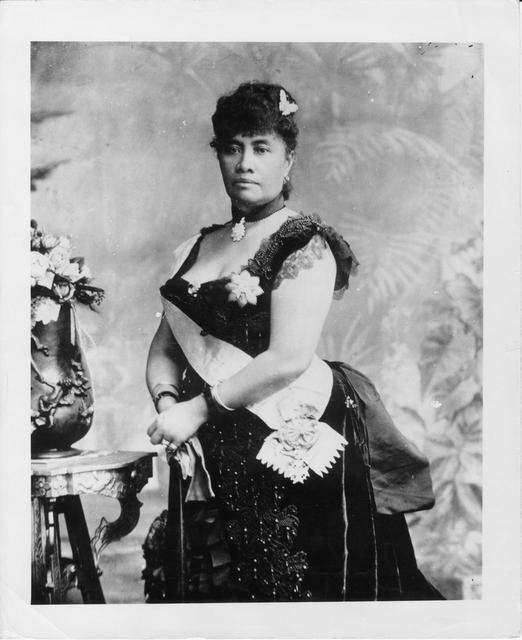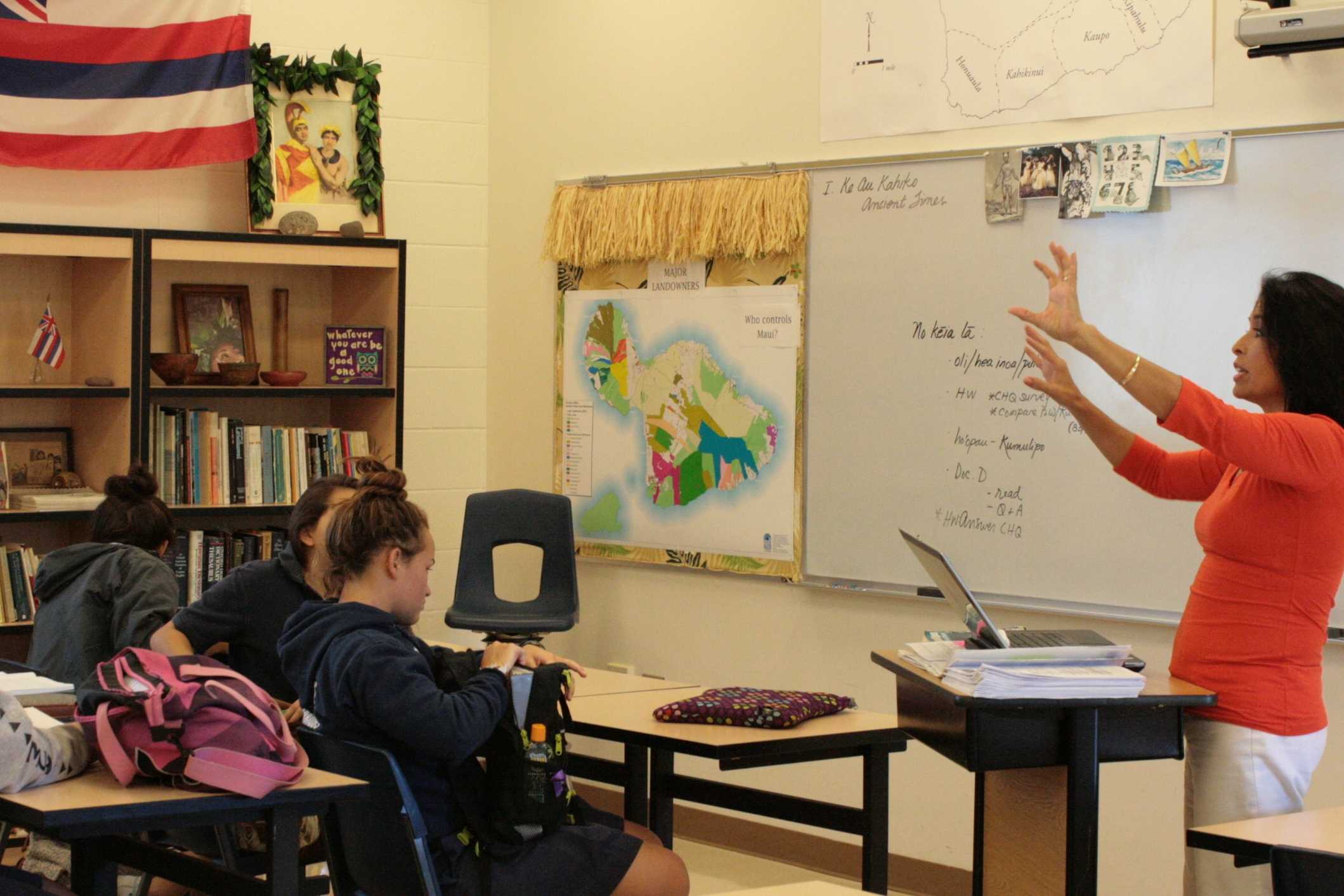January 17, 1893: Hawaiian kingdom overthrown
January 17, 2014
Today marks the 121st anniversary of the death of the Hawaiian monarchy.
It was on January 17, 1893, that Queen Liliʻuokalani’s throne was stolen by non-Hawaiian subjects of the Hawaiian Kingdom.
Previously, Queen Liliʻuokalani had attempted to write a new constitution, as the Hawaiian people were unsatisfied and upset with the one that had currently been in place (this constitution is more commonly known as the Bayonet Constitution).
The group that had created this constitution in the first place, headed by Lorrin A. Thurston, a missionary descendant, feared that their new constitution would be abolished.
Another player in the overthrow, John L. Stevens, wrote to the United States Government and stated that the lives and property of non-natives living in Hawaii were being threatened, and on January 16, U.S Marines and sailors landed on Oʻahu and came ashore armed.
Faced with a powerful group of economically-motivated businessmen who demanded her abdication and U.S. soldiers at the ready to back them up, Queen Liliʻuokalani surrendered her throne and kingdom to avoid bloodshed. She did it under the impression that the American government would right the wrong done to her and her people, but five years later, Hawaiʻi was annexed by the United States, leading them down the path to eventual statehood in 1959.

If you’d like to learn more about the overthrow and the events that sparked it today, here are some resources. The first two are from pro-sovereignty groups.
- An article by Pat Spitzer, who wrote for Honolulu Publishing for 20 years. This article appeared in Aloha Airlines’ in-flight magazine, Spirit of Aloha, in May 1994. It is written in a straightforward manner. The Hawaiian Independence website posted the article and marked it up with hyperlinks to other sites with verifying or clarifying information: hawaii-nation.org
- The Hawaiian Kingdom’s website is headed by Dr. David Keanu Sai, acting Minister of the Interior of the Acting Council of Regency. This is a pro-sovereignty group who is “presently operating within the occupied State of the Hawaiian Islands,” according to Dr. Sai’s welcome letter on the site’s home page. This link will take you to an extensive research page filled with links to artifacts that document the kingdom’s political history: hawaiiankingdom.org
- This is a link to purchase Queen Liliʻuokalani’s book on Amazon. If you don’t want to purchase it today, you can read the first few pages there via Amazon’s preview function (click where it says “look inside”): Hawaiʻi’s Story by Hawaiʻi’s Queen Liliuokalani
- This is another link to Amazon to purchase the late Michael Dougherty’s book, To Steal a Kingdom:Probing Hawaiian History. Written in 2000, the book is widely used in Hawaiian studies courses and traces the origins and development of the Hawaiian people and the history of their governance. Use Amazon’s look inside feature to get a sampling of its contents: To Steal a Kingdom: Probing Hawaiian History by Michael Doughtery

Kaulike Pescaia • Jan 28, 2014 at 6:57 pm
I totally agree with you uncle. I do think a lot about the whole sovereignty thing though. In uncle Kapono’ai’s class, we did an activity where the class picked sides with U.S., Hawai’i, or if they were undecided. We went through a bunch of pros and cons, that we found could actually be balanced out, such as weapons, currency, laws, power, and what not. I would love to be a sovereign country again, but the main thing I have an issue with, is the fact that we are so small. Being the 47th biggest state, we can easily be taken over by any country. U.S. is the reason that we have all the resources we do today, such as weapons and power, and considering the amount of people that live here, who can help us succeed as much as the U.S. has, it seems almost impossible. We are in the middle of the ocean, an open target, and if we become sovereign once again, all this power could be lost. But on the plus side, we could not only be sovereign, but have our culture back, and promote our own culture in Hawai’i, as it was before.
I hope someone is reading this and if you are I would like to propose this. Make a 3 column table. Label one column U.S, one Hawai’i, and one Undecided. Come up with concept that makes a country who they are, such as weapons, currency, government, etc. See which ones can be balanced out and where you can come to a compromise. Also consider the size of the country, where we could store these things, the security, and what not. How safe and powerful would we be as a sovereign country?
Kealii Mossman • Jan 20, 2014 at 10:16 pm
Considering that this is such a hot topic, it’s sad that no one has any comments, particularly in light of the cites that are linked in the article. Since no one has anything to say on this, let me start it off and mix things up a bit.
Not saying that I support the overthrow, but isn’t that just how history works sometimes? Countries and peoples have been fighting and conquering each other since before the nation-state came into existence. We don’t say “the flag never set on the Union Jack” for nothing. Britain had colonies everywhere. And, most of those were obtained or controlled through force. Expansion of empires, control of resources, protection of trade routes, manifest destiny, whatever the reason, countries have taken over other territory for all of recorded history. The Bible is filled with stories of tribes/groups/countries conquering other tribes/groups/countries. While the overthrow of Hawaii was bad for Hawaiians, dwelling on it seems to ignore the fact that stronger countries tend to take over weaker countries. That is, until a bigger dog comes along.
For example, Japan, a small island state, brutally controlled much of Asia until a bigger dog (the US) came along and made it so bad for Japan that Japan surrendered and relinquished control of not only the land it had taken, but even of it’s own country. They lost and had to deal with the consequences. Similarly, most of the countries in the Middle East were created from the British and French Mandates after those two countries had taken control of the region during WW I. If the US had not taken control of the Hawaiian islands, some other country may have come and done the same thing, but in a much more violent way. As it was, the US-supported overthrow was mostly bloodless. While people may criticize the US for its support of the overthrow, at least Hawaii wasn’t overthrown by a country like Imperial Japan (or Nazi Germany or Communist Russia – think Eastern Europe during the first half of the 20th century). Then we’d really have reason to complain.
While we should learn about and understand the impact of the overthrow, dwelling on the past can stunt our growth as a people and prevent us from looking forward. That’s what we should be focusing on – moving forward. Indeed, our school seems to believe that moving forward is important – look at our logo and motto. The word most associated with our school is “IMUA.” Let’s focus on the future and not try to return to some idealized past that can no longer be had. Let it go…
OK, flame away!